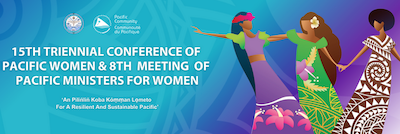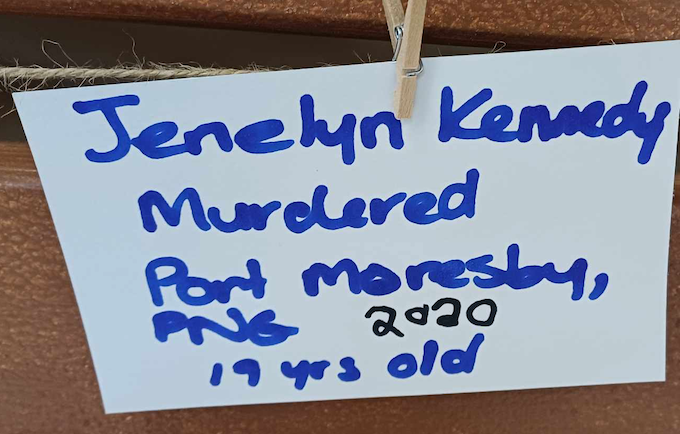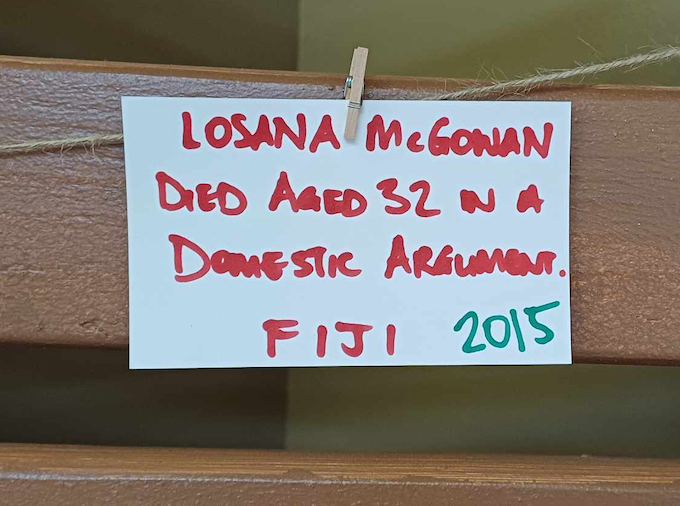The fifth report in a five-part series focused on the 15th Triennial Conference of Pacific Women that took place in the Marshall Islands last week.
SPECIAL REPORT: By Netani Rika in Majuro
On a hastily-erected wall in the Marshall Islands International Conference Centre hang the names of dead women, victims of gender-based violence (GBV).
At least 300 Pacific women were killed in 2021, many at the hands of intimate partners or male relatives, yet there are but 14 names on the board after four days of a Triennial Conference.
So where are the remaining names?

Have these women died in obscurity, their deaths confined to the dust heap somewhere in the region’s collective memory?
Does the memory of their deaths invoke such pain or, perhaps, guilt, that it is impossible for delegates to pick up a pen and put names to paper?
Have these women become mere statistics, their names forgotten as civil society spreadsheets and crime reports log the death of yet another woman.
Or have the deaths of women due to gender-based violence become so common that in the minds of delegates it is normal for a woman to die at the hands of a husband, boyfriend, father or brother?
Falling victim to violence
It has been a conference attended largely by women — ministers, administrators, civil society representatives and local grassroots representatives. Each day there have been more than 200 women at the event.
The 15th Triennial Conference of Pacific Women addressed at its core the need to improve the health of women and children. That includes the need for better access to services and treatment of women who fall victim to violence.

Gender-based violence is also a key focus of the talks. It is that violence — past, present and future – which results in death.
Yet three times a day for three days, on their way to grab a quick coffee or indulge in lunch, friendly conversations or bilateral dialogue, delegates have walked past the wall paying scant attention to the names of their dead Pacific sisters.
No names have been added to the wall since the initial appeal on Day One for attendees to remember the dead, to memorialise women whose lives were cut short in actions which were largely avoidable.
In Fiji, 60 percent of women and girls endure violence in their lifetime. Two of every three experience physical or sexual abuse from intimate partners and one in five have been sexually harassed in the workplace.
The trend is common throughout the region with Kiribati, Papua New Guinea, Fiji and the Solomon Islands recording the highest incidence of crimes against women.

Not one asked for silence
Delegates know these figures. The statistics are, sadly, nothing new.
On the third day, delegates quibbled over the nuances of language and the appropriate terms with which to populate a report on their deliberations. Yet not one asked for a moment of silence to remember the people whose names hung accusingly on a wall outside the meeting chamber.
When delegates left the convention centre on Friday afternoon, it is unlikely they would have remembered even one of the names on the wall.
Those names and the memories of all the women who have suffered violent deaths will await a team of cleaners, strangers, who will bury the Pacific’s collective shame in the sand of Majuro Atoll.
Netani Rika e is communications manager of the Pacific Conference of Churches and is in Majuro, Marshall Islands, covering the 15th Triennial Conference of Pacific Women.
This post was originally published on Asia Pacific Report.